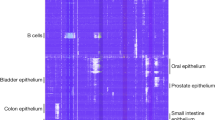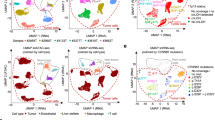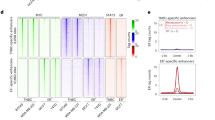Abstract
Activation of the Wnt signaling pathway has been implicated recently in the pathogenesis of leukemia. We studied the function of epigenetic regulation of the Wnt pathway and its prognostic relevance in acute myelogenous leukemia (AML). We used a methylation-specific polymerase chain reaction approach to analyze the promoter methylation status of a panel of Wnt antagonists including sFRP1, sFRP2, sFRP4, sFRP5, DKK1 and DKK3. Aberrant methylation of Wnt antagonists was detected in four AML cell lines and in up to 64% of AML marrow samples. Treatment of the cell lines with 5-aza-2′-deoxycytidine induced reexpression of methylated Wnt antagonists and inactivation of the Wnt pathway by downregulating the Wnt pathway genes cyclin D1, TCF1 and LEF1 and reducing nuclear localization of β-catenin. In a subgroup of patients 60 years and younger with newly diagnosed AML and intermediate-risk cytogenetics, abnormal methylation of Wnt antagonists was associated with decreased 4-year relapse-free survival (28 vs 61%, respectively, P=0.03). Our results indicate a function of the epigenetic regulation of the Wnt pathway in predicting relapse in a subgroup of AML patients.
This is a preview of subscription content, access via your institution
Access options
Subscribe to this journal
Receive 12 print issues and online access
$259.00 per year
only $21.58 per issue
Buy this article
- Purchase on Springer Link
- Instant access to full article PDF
Prices may be subject to local taxes which are calculated during checkout







Similar content being viewed by others
References
O’Sullivan MJ, McCarthy TV, Doyle CT . Familial adenomatous polyposis: from bedside to benchside. Am J Clin Pathol 1998; 109: 521–526.
Taniguchi K, Roberts LR, Aderca IN, Dong X, Oian C, Murphy LM et al. Mutational spectrum of beta-catenin, AXIN1, and AXIN2 in hepatocellular carcinomas and hepatoblastomas. Oncogene 2002; 21: 4863–4871.
Kikuchi A . Tumor formation by genetic mutations in the components of the Wnt signaling pathway. Cancer Sci 2003; 94: 225–229.
Müller-Tidow C, Steffen B, Cauvet T, Tickenbrock L, Ji P, Diederichs S et al. Translocation products in acute myeloid leukemia activate the Wnt signaling pathway in hematopoietic cells. Mol Cell Biol 2004; 24: 2890–2904.
Tickenbrock L, Schwäble J, Wiedehage M, Steffen B, Sargin B, Choudhary C et al. Flt3 tandem duplication mutations cooperate with Wnt signaling in leukemic signal transduction. Blood 2005; 105: 3699–3706.
Wodarz A, Nusse R . Mechanisms of Wnt signaling in development. Ann Rev Cell Dev Biol 1998; 14: 59–88.
Kawano Y, Kypta R . Secreted antagonists of the Wnt signalling pathway. J Cell Sci 2003; 116: 2627–2634.
Suzuki H, Watkins DN, Jair KW, Schuebel KE, Markowitz SD, Chen WD . Epigenetic inactivation of SFRP genes allows constitutive WNT signaling in colorectal cancer. Nat Genet 2004; 36: 417–422.
Román-Gómez J, Cordeu L, Agirre X, Jiménez-Velasco A, San José-Eneriz E, Garate L et al. Epigenetic regulation of Wnt-signaling pathway in acute lymphoblastic leukemia. Blood 2007; 109: 3462–3469.
Liu TH, Raval A, Chen SS, Matkovic JJ, Byrd JC, Plass C . CpG island methylation and expression of the secreted frizzled-related protein gene family in chronic lymphocytic leukemia. Cancer Res 2006; 66: 653–658.
Chim CS, Chan WW, Pang A, Kwong YL . Preferential methylation of Wnt inhibitory factor-1 in acute promyelocytic leukemia: an independent poor prognostic factor. Leukemia 2006; 20: 907–909.
Suzuki R, Onizuka M, Kojima M, Shimada M, Fukagawa S, Tsuboi K et al. Preferential hypermethylation of the Dickkopf-1 promoter in core-binding factor leukaemia. Br J Haematol 2007; 138: 624–631.
Jost E, Schmid J, Wilop S, Schubert C, Suzuki H, Herman JG et al. Epigenetic inactivation of secreted Frizzled-related proteins in acute myeloid leukaemia. Br J Haematol 2008; 142: 745–753.
Benett JM, Catovsky D, Daniel MT, Flandrin G, Galton DAG, Gralnick HR et al. Proposed revised criteria for the classification of acute myeloid leukemia. A report of the French–American–British Cooperative Group. Br J Haematol 1976; 33: 451–458.
ISCN. Guidelines for Cancer Cytogenetics. Supplement to: An International System for Human Cytogenetic Nomenclature, (Shaffer LG, Tommerup N, eds) Karger: Basel, 2005.
Nakao M, Yokota S, Iwai T, Kaneko H, Horiike S, Kashima K et al. Internal tandem duplications of the FLT3 gene found in acute myeloid leukemia. Leukemia 1996; 10: 1911–1918.
Schnittger S, Schoch C, Kern W, Mecucci C, Tschulik C, Martelli MF et al. Nucleophosmin gene mutations are predictors of favorable prognosis in acute myelogenous leukemia with a normal karyotype. Blood 2005; 106: 3733–3739.
Herman JG, Graff JR, Myohanen S, Nelkin BD, Baylin SB . Methylation-specific PCR: a novel PCR assay for methylation status of CpG islands. Proc Natl Acad Sci USA 1996; 93: 9821–9826.
Roman-Gomez J, Jimenez-Velasco A, Agirre X, Castillejo JA, Navarro G, Barrios M et al. Transcriptional silencing of the Dickkopfs-3 (Dkk-3) gene by CpG hypermethylation in acute lymphoblastic leukaemia. Br J Cancer 2004; 91: 707–713.
Kaplan EL, Meier P . Nonparametric estimations from incomplete observations. J Am Stat Assoc 1958; 53: 457–481.
Mantel N . Evaluation of survival data and two new rank order statistics arising in its consideration. Cancer Chemother Rep 1966; 50: 163–170.
Cheson BD, Bennett JM, Kopecky KJ, Büchner T, Willman CL, Estey EH et al. Revised recommendations of the International Working Group for Diagnosis, Standardization of Response Criteria, Treatment Outcomes, and Reporting Standards for Therapeutic Trials in Acute Myeloid Leukemia. J Clin Oncol 2003; 21: 4642–4649.
Reya T, Duncan AW, Ailles L, Domen J, Scherer DC, Willert K et al. A role for Wnt signalling in self-renewal of haematopoietic stem cells. Nature 2003; 423: 409–414.
Weerkamp F, van Dongen JJ, Staal FJ . Notch and Wnt signaling in T-lymphocyte development and acute lymphoblastic leukemia. Leukemia 2006; 20: 1197–1205.
Simon M, Grandage VL, Linch DC, Khwaja A . Constitutive activation of the Wnt/beta-catenin signalling pathway in acute myeloid leukaemia. Oncogene 2005; 24: 2410–2420.
Kajiguchi T, Chung EJ, Lee S, Stine A, Kiyoi H, Naoe T et al. FLT3 regulates beta-catenin tyrosine phosphorylation, nuclear localization, and transcriptional activity in acute myeloid leukemia cells. Leukemia 2007; 21: 2476–2484.
Ysebaert L, Chicanne G, Demur C, De Toni F, Prade-Houdellier N, Ruidavets JB . Expression of beta-catenin by acute myeloid leukemia cells predicts enhanced clonogenic capacities and poor prognosis. Leukemia 2006; 20: 1211–1216.
Mikesch JH, Steffen B, Berdel WE, Serve H, Müller-Tidow C . The emerging role of Wnt signaling in the pathogenesis of acute myeloid leukemia. Leukemia 2007; 21: 1638–1647.
Galm O, Wilop S, Lüders C, Jost E, Gehbauer G, Herman JG . Clinical implications of aberrant DNA methylation patterns in acute myelogenous leukemia. Ann Hematol 2005; 84: 39–46.
Roman-Gomez J, Jimenez-Velasco A, Castillejo JA, Agirre X, Barrios M, Navarro G et al. Promoter hypermethylation of cancer-related genes: a strong independent prognostic factor in acute lymphoblastic leukemia. Blood 2004; 104: 2492–2498.
Veeck J, Geisler C, Noetzel E, Alkaya S, Hartmann A, Knüchel R . Epigenetic inactivation of the secreted frizzled-related protein-5 (SFRP5) gene in human breast cancer is associated with unfavorable prognosis. Carcinogenesis 2008; 29: 991–998.
Melkonyan HS, Chang WC, Shapiro JP, Mahadevappa M, Fitzpatrick PA, Kiefer MC et al. SARPs: a family of secreted apoptosis related proteins. Proc Natl Acad Sci USA 1997; 94: 13636–13641.
Stambolic V, Ruel L, Woodgett JR . Lithium inhibits glycogen synthase kinase-3 activity and mimics wingless signalling in intact cells. Curr Biol 1996; 6: 1664–1668.
Lu Z, Ghosh S, Wang Z, Hunter T . Downregulation of caveolin-1 function by EGF leads to the loss of E-cadherin, increased transcriptional activity of beta-catenin, and enhanced tumor cell invasion. Cancer Cell 2003; 4: 499–515.
Palii SS, Van Emburgh BO, Sankpal UT, Brown KD, Robertson KD . DNA methylation inhibitor 5-Aza-2′-deoxycytidine induces reversible genome-wide DNA damage that is distinctly influenced by DNA methyltransferases 1 and 3B. Mol Cell Biol 2008; 28: 752–771.
Schmelz K, Wagner M, Dörken B, Tamm I . Aza-2′-deoxycytidine induces p21WAF expression by demethylation of p73 leading to p53-independent apoptosis in myeloid leukemia. Int J Cancer 2005; 114: 683–695.
Moreno I, Martín G, Bolufer P, Barragán E, Rueda E, Román J et al. Incidence and prognostic value of FLT3 internal tandem duplication and D835 mutations in acute myeloid leukaemia. Haematologica 2003; 88: 19–24.
Acknowledgements
This work was partially supported by Instituto de Salud Carlos III grants RD06/0020/0031 and PI 06/0657 and the Asociación para la Lucha contra la Leucemia de la Comunidad Valenciana (ASLEUVAL).
Author information
Authors and Affiliations
Corresponding author
Rights and permissions
About this article
Cite this article
Valencia, A., Román-Gómez, J., Cervera, J. et al. Wnt signaling pathway is epigenetically regulated by methylation of Wnt antagonists in acute myeloid leukemia. Leukemia 23, 1658–1666 (2009). https://doi.org/10.1038/leu.2009.86
Received:
Revised:
Accepted:
Published:
Issue Date:
DOI: https://doi.org/10.1038/leu.2009.86
Keywords
This article is cited by
-
Esculetin releases maturation arrest and induces terminal differentiation in leukemic blast cells by altering the Wnt signaling axes
BMC Cancer (2023)
-
Epigenomic analysis reveals a unique DNA methylation program of metastasis-competent circulating tumor cells in colorectal cancer
Scientific Reports (2023)
-
The antitumor effects of WNT5A against hematological malignancies
Journal of Cell Communication and Signaling (2023)
-
Targeting signalling pathways and the immune microenvironment of cancer stem cells — a clinical update
Nature Reviews Clinical Oncology (2020)
-
Differences in expression and function of LEF1 isoforms in normal versus leukemic hematopoiesis
Leukemia (2020)



